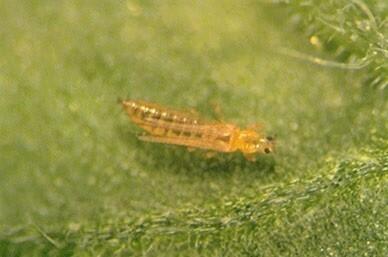In a collaborated effort, Senior Research Scientist Hiroshi Abe and Division Head Masatomo Kobayashi of the Experimental Plant Division, RIKEN BioResource Research Center (BRC), Senior Researcher Tamito Sakurai of the Central Region Agricultural Research Center (CARC), National Agriculture and Food Research Organization (NARO), the Kanagawa Agricultural Technology Center and the Hiroshima Prefectural Technology Research Institute, have announced a successful trial of an insect repellent against thrips. By boosting plant defenses against pests and repelling insects, it reduces crop damage and prevents the transmission of plant viruses by insects. The substance is not an insecticide, thereby mostly eliminating incidents of resistant insects. This breakthrough is expected to contribute to the sustainability of farming by reducing dependence on agricultural chemicals.

(Credit; Hiroshima Prefectural Technology Research Institute)
A growing major issue in agriculture in recent years is the increasing difficulty of bug control due to insecticide resistance arising from persistent insecticide use. One such insect, found domestically and overseas, is the thrip, which has developed strong resistance to insecticides and is of such a small size, of only 1-2mm, that it is very challenging to prevent from entering large-scale horticultural facilities including indoor farms. Thrips do not just reduce the value of crops they feed on, they also spread plant viruses across a wide variety of plants due to their indiscriminate parasitism, from brassicas to nightshades, cucurbits and Asteraceae.
The research group found that the protective plant hormones jasmonic acid and salicylic acid are especially strongly involved. When a plant is damaged it biosynthesizes jasmonic acid to repel harmful insects, and when it is infected with disease-causing pathogens it biosynthesizes salicylic acid and becomes more resistant.
The research group considered a trial to see whether they could expand the application of jasmonic acid analog Prohydrojasmon (PDJ), which is already commercialized as a plant growth regulator, to repel thrips. The work was undertaken with the support of the Cabinet Office's Cross-ministerial Strategic Innovation Promotion Program (SIP), "Technologies for creating next-generation agriculture, forestry and fisheries."
The trial started in 2014 to test the effectiveness of PDJ in repelling thrips in greenhouse tomato plots. The trial ran in eight greenhouses in different climates across Japan including Kanagawa Prefecture, Hiroshima Prefecture and Ibaraki Prefecture. Thrips were already present in the facilities, with the conditions of the trial altered to observe natural changes over time. For the PDJ, Jasmomate developed by Zeon Corporation was used.
Its effectiveness in repelling thrips was proven by 2017. By including phytotoxicity testing and two years of crop residue testing data, the requirements for application expansion were met so that in June 2017, an application was registered with the Food and Agricultural Materials Inspection Center for the use of PDJ as an effective repellent against thrips in tomatoes. Agricultural chemical registration was obtained from the Ministry of Agriculture, Forestry and Fisheries on March 26 of this year.
The repellency of PDJ comes from the high sensitivity of thrips to jasmonic acid. It is dispersed around the time of planting at the outset, repelling insects or reducing the damage they cause. The trial also confirmed a reduced transmission rate of viruses via damage to the plants from thrip feeding.
PDJ is a jasmonic acid analog that is already approved as a plant growth regulator, and has been primarily used to promote coloration in fruit. It is a compound slightly different in its structure from jasmonic acid and is proven to repel thrips from thale-cress, as well as jasmonic acid, while suppressing fertility inhibition effects.
Abe explains that, "Currently, we are at the first step of application to tomatoes. We are hoping to now prove effectiveness in other plants and increase the crops it #Biologycan be applied to. We would also like to test its effectiveness and applicability to insects other than thrips."
This article has been translated by JST with permission from The Science News Ltd.(https://sci-news.co.jp/). Unauthorized reproduction of the article and photographs is prohibited.




